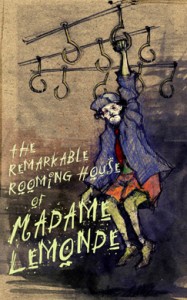Theater Review: The Remarkable Rooming House of Tennessee Williams
By Bill Marx
What are artists? Desperate searchers after whatever can be found of truth and beauty, even when the two may be poles apart. – Tennessee Williams, “Notebooks” (1979)
The Remarkable Rooming House of Madame Le Monde by Tennessee Williams. Directed by Davis Robinson. Beau Jest Moving Theater production (commissioned by the Provincetown Tennessee Williams Theater Festival) presented at the Charlestown Working Theater, September 19. The production will then be presented as part of the fourth annual PTWTF, September 25 through 27 at the Provincetown Wharf Building, Provincetown, MA.
 For Tennessee Williams, when the truth is wanton cruelty beauty becomes an absurdity. At least that is the impression left by the superb Beau Jest Moving Theater world premiere production of “The Remarkable Rooming House of Madame Le Monde,” a macabre but fascinating comic sketch that the playwright (1911-1983) wrote near the end of his life.
For Tennessee Williams, when the truth is wanton cruelty beauty becomes an absurdity. At least that is the impression left by the superb Beau Jest Moving Theater world premiere production of “The Remarkable Rooming House of Madame Le Monde,” a macabre but fascinating comic sketch that the playwright (1911-1983) wrote near the end of his life.
It should be required viewing for those who love Williams in all of his artistic manifestations, and of interest to theatergoers who relish a first-rate theatrical imagination applied to the mordantly unusual. I’ve heard that this evening’s performance at the CWT is sold out – luckily the Provincetown Tennessee Williams Theater Festival will provide more opportunities to see the show later this month. Adventurous souls should disregard the mileage and consider the challenging rewards.
The odd piece is one of a series of black comic sketches that Willams called “Guignol,” Beckettesque squibs whose dank sex and violence are designed to “shock” audiences. The Beau Jest production dovetails a powerful rendition of Williams’s grotesque vision of life as a Darwinian slaughterhouse with a surprising amount of tenderness, even lyrical finesse. The play supplies more evidence that, as the curator of the PTWTF, David Kaplan, insisted in an informative after-performance discussion, Williams continued to write significant drama after critics had written him off as a burnt out case in the early 1960s.
What must be understood is that Williams was no longer, as least with plays like this, catering to mainstream tastes. “The Remarkable Rooming House of Madame Le Monde” is stylized, nonsensical-seeming vaudeville in the mode of Artaud and Ionesco, a personal cry of pain that manages to be both playfully visceral and metaphysical at the same time. It also has its share of grisly laughs.
Set in a seedy attic in London, the action revolves around an image that brilliantly sets up the play’s concatenation of predators-turned-prey. A man named Mint is paralyzed; the only way he can only move about his room is via a series of hooks in the ceiling. (The son of a Kosher butcher, I have seen animal carcasses moved about a “killing” room in much the same way.) Tea time approaches, but before the guest arrives Mint is sexually assaulted by one of the muscular sons of the boarding house owner, Madame Le Monde.
The visitor expected for tea, Hall, arrives, claiming to be an old school mate of Mint’s. Terminally self-absorbed and gutter-minded, he is more concerned with eating, drinking, and telling salacious stories than helping his hungry friend, who is often writhing on the floor, desperate for a bit of biscuit.
Hall is a creepily humorous caricature of a British aristocrat-capitalist: his rancid Music Hall routine amuses because Larry Coen sprinkles the broad blue farce with moments of self-conscious sadism. Hall enjoys himself all the more because his audience, Mint, is so helpless. (Williams may be saying something about the complex power of theatrical performance with this relationship.)
Madame Le Monde, a powerful redhead, a fountainhead of birth and death, embodies a cosmic degree of indifference. She lowers the primal boom on those scrambling to satisfy their desires in her “house.”
Robinson has found an ingenious way to solve what looks like an impossible problem posed by the script: how do you have Mint jump from from hook to hook throughout the show? Jordan Harrison makes the figure more than a sad pitiful wretch (or a poster boy for Williams’s self-pity) by giving the character a stubborn sense of dignity, a ludicrous but touching resilience. Lisa Tucker invests Madame Le Monde with firecracker command. Rafael Jaen’s terrific costumes evoke the ironic paradoxes of Williams’s surreal but lethal world.
Robinson says he has another evening of Williams “Guignol” in mind, “The Remarkable Rooming House of Madame Le Monde” coupled with two other short plays that reflect the antic terror of Williams’s imagination in the final stage of his writing career. Given the high quality of this Beau Jest Moving Theater production we should root for a quick return to the vicious rooming house. Chances are that the production would not only open our eyes to new, provocative facets of a master playwright’s talent, but be a fitting tribute to the admirable artistry of a Boston theater company now celebrating its 25th year.
Bill Marx is the editor-in-chief of the Arts Fuse. For four decades, he has written about arts and culture for print, broadcast, and online. He has regularly reviewed theater for National Public Radio Station WBUR and the Boston Globe. He created and edited WBUR Online Arts, a cultural webzine that in 2004 won an Online Journalism Award for Specialty Journalism. In 2007 he created the Arts Fuse, an online magazine dedicated to covering arts and culture in Boston and throughout New England.
